Ditapis dengan
E-book Carolingian Medical Knowledge and Practice, c.775-900 : New Approach…
So begins an entry within a collection of medical recipes found in an early ninth-century medical manuscript located in the Stiftsbibliothek St. Gallen, cod. sang. 759 (see Figure 1).2 This collection, covering roughly the second half of the manuscript (pp. 58–94), includes a vast range of material, from recipes for scented ointments to treatments for blindness, skin co…
- Edisi
- -
- ISBN/ISSN
- 9789004466173
- Deskripsi Fisik
- 436 hlm
- Judul Seri
- -
- No. Panggil
- 419 BUR c
E-book Velar Fronting in German Dialects : A Study in Synchronic and Diachron…
The distribution of German dorsal fricatives – palatal [ç] and velar [x] – haspreoccupied linguists of diverse theoretical persuasions for over ninety years.Scholars who have discussed the patterning of those sounds include the follow-ing:Jones (1929),Hermann (1932),Bloomfield (1933),Trubetzkoy (1939),Moul-ton (1947),Leopold (1948),Jones (1950),Trim (1951),Dietrich (1953),Trost (1958),Heik…
- Edisi
- -
- ISBN/ISSN
- 9783961103980
- Deskripsi Fisik
- 922 hlm
- Judul Seri
- -
- No. Panggil
- 410 HAL v
E-book Understanding Irish Spelling : A Handbook for Teachers and Learners
The quotation above was one of several responses received from teachers in a series of interviews that sought their perceptions of how Irish reading is taught and of the particular challenges they face in helping school children develop literacy skills in their second language. Although less specific than some responses, this one captures vividly the sense of frustration on the part of teac…
- Edisi
- -
- ISBN/ISSN
- -
- Deskripsi Fisik
- 132 hlm
- Judul Seri
- -
- No. Panggil
- 491.6 STE u
E-book Children’s Literature in Translation : Texts and Contexts
Be it explicit or implicit, all translators have some awareness of context when translating a text. Rodica Dimitriu calls context a key notion in translation studies and one that allows for “complex analyses of the translator’s activities and decisions, of translation processes and, ultimately, of what accounts for the meaning(s) of a translated text” (Dimitriu 2005, 5). However, there is…
- Edisi
- -
- ISBN/ISSN
- 978946166320
- Deskripsi Fisik
- 280 hlm
- Judul Seri
- -
- No. Panggil
- 418.02 ALF c

E-book Write Yourself: Creative Writing and Personal Development (Writing for…
Write Yourself is a complete introduction to facilitating creative writing for therapy or personal development, both with individuals and groups. Clear and practical, and with a strong theoretical base, it is also an essential handbook for individuals embarking on their own personal writing journeys. Topics covered include the nature, values and principles of therapeutic creative writing, how t…
- Edisi
- -
- ISBN/ISSN
- 9781849051101
- Deskripsi Fisik
- 290 halaman, ilus.
- Judul Seri
- -
- No. Panggil
- 431 BOL w
E-book The Writing of Disaster - Literary Representations of War, Trauma and …
In the past few years a number of book-length English-language studies of the cultural dimensions of disasters in modern Japan have appeared in print.2 The question arises: Why do we need another? The reason is that none of these books concentrates solely on literature, as this book does, and only a few of the volumes treat the disaster spawned by World War II—the most destruc-tive military c…
- Edisi
- -
- ISBN/ISSN
- 9783631808290
- Deskripsi Fisik
- 276 hlm
- Judul Seri
- -
- No. Panggil
- 410 MOR t
E-book Science & Technology Studies Elsewhere : A Postcolonial Programme
In April 2017, scientists took to the streets in a historically unprecedented Global March for Science. The event was seen as symbolic of a crisis in the relationship of science and society. This book considers the Global March for Science from a postcolonial perspective to inquire into the toolkit that the academic field of Science & Technology Studies (STS) has to offer. It argues that new co…
- Edisi
- -
- ISBN/ISSN
- 9783757400392
- Deskripsi Fisik
- 326 hlm
- Judul Seri
- -
- No. Panggil
- 417.7 HOF s
E-book A Featural Typology of Bantu Agreement
How can there be so many different languages in the world while the abilityto use language seems to be fundamentally the same for every human being?This is without doubt one of the core questions of linguistics, and it is thisBig Question that is hidden behind the smaller questions in this book. Tostudy the variation and the underlying linguistic system in a scientific way,we ideally want to ha…
- Edisi
- -
- ISBN/ISSN
- 9780198844280
- Deskripsi Fisik
- 337 hlm
- Judul Seri
- -
- No. Panggil
- 415 VAN a
E-book The Reflexes of Syllabic Liquids in Ancient Greek : Linguistic Prehist…
Author(s) van Beek, Lucien Collection Dutch Research Council (NWO) Language English Show full item record Reflexes of syllabic liquids play an important yet controversial role in Greek dialect classification and the analysis of Homeric formulas. This book tackles the entire evidence afresh and elaborates a ground-breaking new scenario of language change in the epic tradition.; Readership…
- Edisi
- -
- ISBN/ISSN
- 9789004469747
- Deskripsi Fisik
- 587 hlm
- Judul Seri
- -
- No. Panggil
- 417.7 VAN t
E-book Old Church Slavic : Grammar and Dictionaries
This is a difficult book. For specialists in Slavic linguistics, the familiar material of Old Church Slavic appears under shockingly novel light. For theoretical linguists, this work presents a construct unlike any other with the word grammar in the title. For all readers, the grammar is difficult because the complex formal appa-ratus is stated declaratively, not procedurally, and thus its vali…
- Edisi
- -
- ISBN/ISSN
- 9791221501049
- Deskripsi Fisik
- 838 hlm
- Judul Seri
- -
- No. Panggil
- 414 KEI o
E-book Creating Standards : Interactions with Arabic script in 12 manuscript …
Manuscripts originate from literacy practices embedded in numerous social domains, such as education, administration, religion and trade. Expressed in spoken and written languages, various social activities prompt the development of organising principles and structures, which in turn serve as models for the agents and participants of literacy practices. The…
- Edisi
- -
- ISBN/ISSN
- 9783110639063
- Deskripsi Fisik
- 334 hlm
- Judul Seri
- -
- No. Panggil
- 492.7 BON c
E-book Formulaic Language : Theories and Methods
Of the many types of multiword expressions identified in the literature, the cur-rent study focuses on a small, structurally defined set of possible prefabricatedsequences (prefabs), in particular, attributive adjective-noun sequences as usedin American English conversation. The paper examines the role of frequency of One source of interest in multiword expressions (MWEs) derived from corpusstu…
- Edisi
- vol.5
- ISBN/ISSN
- 9783961103102
- Deskripsi Fisik
- 241 hlm
- Judul Seri
- -
- No. Panggil
- 410 TRK f
Espanol Para Indonesios (Nivel Basico = Tingkat Pemula)
Di era globaliasi ini, menimba ilmu pengetahuan di perguruan tinggi sudah menjadi hal yang wajar. Bahkan sekarang ini semakin banyak orang Indonesia yang meneruskan pendidikan ke tingkat strata 2 dan strata 3 ke luar negeri. Negara-negara seperti Inggris, Prancis, Jerman, Jepang, dan Spanyol menjadi tempat tujuan untuk menimba ilmu. Namun, ada kalanya kita tidak dapat melanjutkan sekolah ke lua…
- Edisi
- -
- ISBN/ISSN
- 9789795934370
- Deskripsi Fisik
- xii + 221 hlm; 13 x 20 cm
- Judul Seri
- -
- No. Panggil
- 463 SUP e
Kamus Seri Tiga Bahasa : Inggris Spanyol Indonesia
Arus informasi yang semakin meluas antar negara membutuhkan kemampuan memahami bahasa asing secara lebih mendalam. Seperti kita ketahui, bahasa Inggris merupakan salah satu kunci berkomunikasi di dunia internasional. Akan tetapi, komunikasi ini akan lebih baik jika didukung oleh kemampuan bahasa asing lainnya. Bahasa Spanyol merupakan salah satu bahasa yang populer dan banyak diminati di seluru…
- Edisi
- -
- ISBN/ISSN
- 9789795934400
- Deskripsi Fisik
- vi + 270 hlm; 12.5 x 18.5 cm
- Judul Seri
- -
- No. Panggil
- 413.2161 SIM k
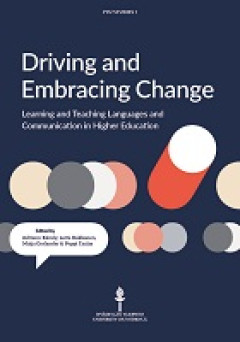
E-book Driving and Embracing Change: Learning and Teaching Languages and Comm…
When considering the title of this book, we, as its editors, had to reflect on the notion of change. Change is constant and inevitable, but fundamental changes do not happen overnight. Such changes result from actions and measures that address deep, complex and interrelated systemic issues, and thus require a shift in mindset. Fifty years ago, Gregory Bateson (1972/2000), an early advocate for …
- Edisi
- -
- ISBN/ISSN
- 9789528602415
- Deskripsi Fisik
- 240 halaman
- Judul Seri
- -
- No. Panggil
- 4014 KOK d
Kamus Besar Bahasa Indonesia
Kamus Besar Bahasa Indonesia ini merupakan usaha yang bertujuan mencakup sebagian besar kata dan ungkapan Bahasa Indonesia yang paling umum dipakai. Kita semua mengetahui Bahasa Indonesia merupakan bahasa resmi Nasional. Dalam perkembangannya Bahasa Indonesia banyak mendapat pengaruh atau masukan dari bahasa ibu/daerah dan bahasa asing. Kamus ini mengandung kosa kata dengan frekuensi yang tingg…
- Edisi
- -
- ISBN/ISSN
- 9786028517027
- Deskripsi Fisik
- 704 hlm; 16 x 25 cm
- Judul Seri
- -
- No. Panggil
- 413 SUH k
Kamus Umum Bahasa Indonesia
Keperluan akan adanya kamus Bahasa Indonesia yang dapat memberikan pedoman praktis bagi masyarakat makin terasa, lebih-lebih karena perkembangan bahasa Indonesia kita pesat dan karena pemakai bahasa nasional kita itu kian tinggi kesadarannya akan pentingnya kecermatan dalam berbahasa. Hal ini pastilah disadari pula oleh penulis ketika beliau menyebutkan dalam kata pengantar yang diarahkan kepad…
- Edisi
- -
- ISBN/ISSN
- -
- Deskripsi Fisik
- 1156 hlm; 15 x 21 cm
- Judul Seri
- -
- No. Panggil
- 413 POE k

E-book Reflexively Speaking : Metadiscourse in English as a Lingua Franca
Ten years ago, I remarked on the surprisingly small proportion of metadiscoursestudies that investigated spoken discourse compared to the total amount of meta-discourse research (Mauranen 2012). This is still true, even though much more re-search has been devoted to spoken discourses since then. The proportional gapremains enormous. If we look for studies addressing not only speaking in general…
- Edisi
- -
- ISBN/ISSN
- 9783110295498
- Deskripsi Fisik
- 249 hlm
- Judul Seri
- -
- No. Panggil
- 410 MAU r
E-book Learners in Transition : Chinese Students’ Journeys from EFL to ESL …
It may be necessary here to give a very brief sketch of Confucian thought and its paramount influence on Chinese culture. Confucius (551–479 bc) lived during the Spring and Autumn and Warring States periods (770–221 bc), which was an unprec-edented era of cultural flowering amidst conflict and civil strife in the history of China. As the “First Teacher of China” (Jin & Cortazzi, 2006), …
- Edisi
- -
- ISBN/ISSN
- 9780203729380
- Deskripsi Fisik
- 193 hlm
- Judul Seri
- -
- No. Panggil
- 400 FON l

E-book Thick Evaluation
magine I tell you that Maddy is bad. Perhaps you infer from my intonation, or thecontext in which we are talking, that I mean morally bad. Additionally, you willprobably infer that I am disapproving of Maddy, or saying that I think you shoulddisapprove of her, or similar, given typical linguistic conventions and assuming I amsincere. However, you might not get a more detailed sense of the parti…
- Edisi
- -
- ISBN/ISSN
- 9780198803430
- Deskripsi Fisik
- 211 hlm
- Judul Seri
- -
- No. Panggil
- 401 KIR t
E-book Bahasa Spanyol Bahasa Sahabatku
- Edisi
- -
- ISBN/ISSN
- 9786024379391
- Deskripsi Fisik
- 2008
- Judul Seri
- -
- No. Panggil
- 460 CAS b
- Edisi
- -
- ISBN/ISSN
- 9786024379391
- Deskripsi Fisik
- 2008
- Judul Seri
- -
- No. Panggil
- 460 CAS b
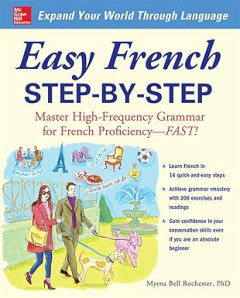
E-book Easy French Step-by-Step
Easy French Step by Step proves that a solid grounding in grammar basics is the key to mastering a second language. You are quickly introduced to grammatical rules and concepts in order of importance, which you can build on as you progress through the book. You will also learn more than 300 verbs, chosen by their frequency of use. Numerous exercises and engaging readings help you quickly build …
- Edisi
- -
- ISBN/ISSN
- 9780071453875
- Deskripsi Fisik
- 399 halaman
- Judul Seri
- -
- No. Panggil
- 440 ROC e

E-book Colloquial French: The Complete Course for Beginners
Colloquial French: The Complete Course for Beginners has been carefully developed by an experienced teacher to provide a step-by-step course to French as it is written and spoken today.
- Edisi
- -
- ISBN/ISSN
- 9780415340137
- Deskripsi Fisik
- 287 halaman
- Judul Seri
- -
- No. Panggil
- 440 DEM c
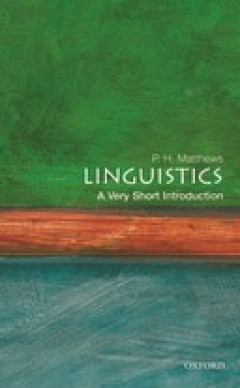
E-book Linguistics: A Very Short Introduction
Linguistics: A Very Short Introduction considers a subject that falls in the gap between arts and science, on the edges of which fascinating discoveries and important problems are found. Beginning with the oldest, ‘arts’ end of the subject, it moves chronologically through to the newest research — the ‘science’ aspects. Themes included are: the prehistory of languages and their common…
- Edisi
- -
- ISBN/ISSN
- 9780192801487
- Deskripsi Fisik
- 289 halaman
- Judul Seri
- -
- No. Panggil
- 410 MAT l
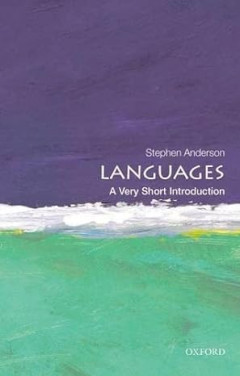
E-book Languages: A Very Short Introduction
How many languages are there? What differentiates one language from another? Are new languages still being discovered? Why are so many languages disappearing? The diversity of languages today is varied, but it is steadily declining. In this Very Short Introduction, Stephen Anderson answers the above questions by looking at the science behind languages. Considering a wide range of different l…
- Edisi
- -
- ISBN/ISSN
- 9780199590599
- Deskripsi Fisik
- 313 halaman
- Judul Seri
- -
- No. Panggil
- 400.0 AND l
E-book Oxford Latin Course
Horace's day than with an Englishman of the Middle Ages. Lastly, to read and understand Latin, you need to think clearly; this is a skill which is essential in all academic subjects and, indeed, in the whole of life. It would be wrong to pretend that Latin is easy but we hope our course will make the process of learning it both interesting and enjoyable.
- Edisi
- -
- ISBN/ISSN
- 0195212037
- Deskripsi Fisik
- 159 hlm
- Judul Seri
- -
- No. Panggil
- 470 MAU o
E-book The Study of Language
We don’t usually think of speaking as similar to chewing, licking and sucking, but, like speaking, all of these actions involve movements of the mouth, tongue and lips in some kind of controlled way. So, perhaps this connection is not as improbable as it first sounds. It is an example of the type of observation that can lead to interesting speculations about the origins of spoken language. Th…
- Edisi
- 3rd ed.
- ISBN/ISSN
- 9780511134937
- Deskripsi Fisik
- 286 hlm
- Judul Seri
- -
- No. Panggil
- 400 YUL t
E-book Simplified Signs : A Manual Sign-Communication System for Special Popu…
Many children and adults experience considerable difficulty producing or understanding a spoken language despite having adequate hearing levels. Some of these persons may benefit from learning a full and genuine sign language, such as one of the sign languages used by members of a Deaf1 community. They may acquire a substantial vocabulary of signs and learn to combine them into complex s…
- Edisi
- -
- ISBN/ISSN
- 9781800640047
- Deskripsi Fisik
- 1139 hlm
- Judul Seri
- -
- No. Panggil
- 419 BON s
E-book Inquisitive Semantics
Inquisitive semantics is a new semantic framework mainly intended forthe analysis of linguistic information exchange. Information exchangecan be seen as a process of raising and resolving issues. Inquisitivesemantics provides a new formal notion of issues, which makes itpossible to model various concepts that are crucial for the analysis oflinguistic information exchange in a more refined and m…
- Edisi
- -
- ISBN/ISSN
- 9780198814788
- Deskripsi Fisik
- -
- Judul Seri
- -
- No. Panggil
- 401 CIA i
E-book Getting Others to do Things : A Pragmatic Typology of Recruitments
Research in the fields of conversation analysis, ethnomethodology, and inter-actional linguistics is perhaps closest to the approach taken here, for a few rea-sons. One is that the empirical source of data is recordings of informal interaction.Another is that the units of analysis are not clauses or sentences but moves in con-versational sequences (Wootton 1981;1997;Lindström 2005;Vinkhuyzen &…
- Edisi
- -
- ISBN/ISSN
- 9783961102785
- Deskripsi Fisik
- 435 hlm
- Judul Seri
- -
- No. Panggil
- 410 ENF g
E-book Seri Bahan Ajar: Bahasa Rusia
- Edisi
- -
- ISBN/ISSN
- 9786024371838
- Deskripsi Fisik
- ii, 242 hlm.; 26 cm.
- Judul Seri
- -
- No. Panggil
- 491.7 ROM s
- Edisi
- -
- ISBN/ISSN
- 9786024371838
- Deskripsi Fisik
- ii, 242 hlm.; 26 cm.
- Judul Seri
- -
- No. Panggil
- 491.7 ROM s
E-book Language Dispersal Beyond Farming
Just as plant and animal lineages are not uniformly distributed around the world, the same is true for the distribution of language families. As of 2017 the Ethnologue list includes around 50 distinct language families covering 7099 living languages, some of which, like Austronesian, have spread over a huge geographical range while others, like Amuric, have only a single living member (i.e., Ni…
- Edisi
- -
- ISBN/ISSN
- 9789027212559
- Deskripsi Fisik
- 340 hlm
- Judul Seri
- -
- No. Panggil
- 417.7 ADE l
E-book Synchronic and Diachronic Aspects of Kanashi
The physical seclusion of the village and the social aloofness of the Kanashicommunity have contributed to the maintenance of its traditional culture and lan-guage,butrecentdevelopmentsarethreateningthetraditionallifestyle,includingthe language, where especially contact with Hindi4is becoming an integral partof the villagers’ daily lives. This is the latest episode in a long history of contin…
- Edisi
- -
- ISBN/ISSN
- 9783110703245
- Deskripsi Fisik
- 331 hlm
- Judul Seri
- -
- No. Panggil
- 417.7 SAX s
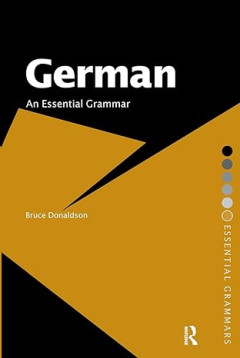
E-book German: An Essential Grammar
German: An Essential Grammar is a practical reference guide to the core structures and features of modern German. Presenting a fresh and accessible description of the language, this engaging grammar uses clear, jargon-free explanations and sets out the complexities of German in short, readable sections. Suitable for either independent study or for students in schools, colleges, universities …
- Edisi
- -
- ISBN/ISSN
- 9780415366021
- Deskripsi Fisik
- 285 halaman
- Judul Seri
- -
- No. Panggil
- 430 DON g

E-book More Chinese for Kids Flash Cards Simplified Character Edition
he Tuttle MORE Chinese for Kids Flash Cards (Simplified Character Edition) kit is an introductory Mandarin language learning tool especially designed to help children from preschool through early elementary level acquire basic words, Chinese characters, phrases, and sentences in Chinese in a fun and easy way. The flashcards can be used as a learning tool in a classroom setting, at home, or a…
- Edisi
- -
- ISBN/ISSN
- 9780804839396
- Deskripsi Fisik
- 169 halaman, ilus.
- Judul Seri
- -
- No. Panggil
- 495.1 TUT m
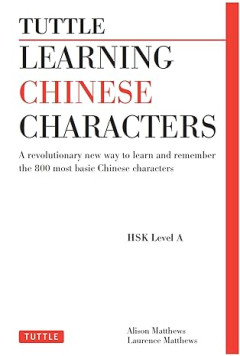
E-book Tuttle Learning Chinese Characters: HSK Level A (1 -3)
This user-friendly book is aimed at helping students of Mandarin Chinese learn and remember Chinese characters. At last--there is a truly effective and enjoyable way to learn Chinese characters! This book helps students to learn and remember both the meanings and the pronunciations of over 800 characters. This otherwise daunting task is made easier by the use of techniques based on the psych…
- Edisi
- -
- ISBN/ISSN
- 9781462901289
- Deskripsi Fisik
- 744 halaman
- Judul Seri
- -
- No. Panggil
- 495.1 MAT t
E-book A Grammar of Akajeru : Fragments of a traditional North Andamanese dia…
The primary sources for this work are the fragments of Akajeru (words, phrases and some short sentences) contained (passim) in the pages of Alfred R. Radcliffe-Brown’s monograph The Andaman Islanders (1922), which gathers the results of his anthropological research carried out on the Andamans between 1906 and 1908. Although the languages of the archipelago wer…
- Edisi
- -
- ISBN/ISSN
- 9781800080935
- Deskripsi Fisik
- 186 hlm
- Judul Seri
- -
- No. Panggil
- 415 ZAM a
E-book First 1000 Words in Arabic
This is an introduction to 1000 common words in classical Arabic. Arranged thematically, many of the pages show an everyday scene, surrounded by pictures of objects from the scene with their Arabic names. An Arabic/English dictionary of all the words is included.
- Edisi
- -
- ISBN/ISSN
- 9780746046517
- Deskripsi Fisik
- 64 halaman, ilus.
- Judul Seri
- -
- No. Panggil
- 492.7 AME f

E-book Ngomong Mandarin, Ngobrolin China
Perkembangan China yang begitu pesat, didukung kuatnya pengaruh globalisasi, membuat kebutuhan menguasai bahasa Mandarin tidak terhindarkan lagi. Bahasa ini kian populer dipelajari hampir semua kalangan, baik komunitas Tionghoa maupun komunitas lain, untuk pergaulan, pendidikan, dan bisnis. Ngomong Mandarin, Ngobrolin China disusun oleh Penulis yang mengantongi berbagai prestasi di dalam dan lu…
- Edisi
- -
- ISBN/ISSN
- 9789792299816
- Deskripsi Fisik
- 198 halaman
- Judul Seri
- -
- No. Panggil
- 495.1 BAS n

E-book Chineasy: The New Way to Read Chinese
Learn to read and write Chinese with Chineasy—a groundbreaking approach that transforms key Chinese characters into pictograms for easy recall and comprehension. Chinese is one of the oldest written languages, and one of the most difficult to master, especially for Westerners. With Chineasy, learning and reading Chinese has never been simpler or more fun. Breaking down the Great Wall of La…
- Edisi
- -
- ISBN/ISSN
- 9780062332097
- Deskripsi Fisik
- 197 halaman, ilus.
- Judul Seri
- -
- No. Panggil
- 495.1 SHA c
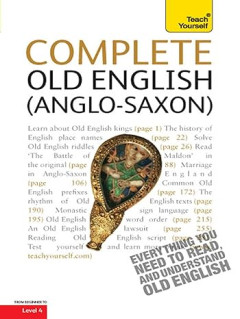
E-book Complete Old English: A Comprehensive Guide to Reading and Understandi…
Learn Old English (Anglo-Saxon) with this best-selling course from Teach Yourself - the No. 1 brand in language learning. Equally suited to general reader, historian and student of literature, this new edition teaches vocabulary and grammar through original texts, with audio support, traces the roots of modern English words, and explores the Anglo-Saxon cultural context through poems, prose and…
- Edisi
- -
- ISBN/ISSN
- 9781444104202
- Deskripsi Fisik
- 369 halaman
- Judul Seri
- -
- No. Panggil
- 429 ATH c
E-book The Oxford History of English
Lynda Mugglestone's hugely popular The Oxford History of English is now updated and entirely reset in a new edition featuring David Crystal's new take on the future of English in the wider world. In accounts made vivid with examples from a vast range of documentary evidence that includes letters, diaries, and private records, fifteen scholars trace the history of English from its ancient Ind…
- Edisi
- -
- ISBN/ISSN
- 9780199249312
- Deskripsi Fisik
- 500 halaman
- Judul Seri
- -
- No. Panggil
- 420.9 MUG t
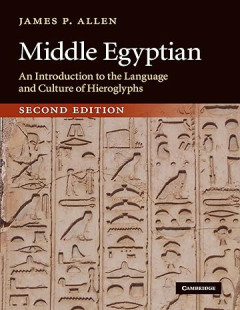
E-book Middle Egyptian: An Introduction to the Language and Culture of Hierog…
Middle Egyptian introduces the reader to the writing system of ancient Egypt and the language of hieroglyphic texts. It contains twenty-six lessons, exercises (with answers), a list of hieroglyphic signs, and a dictionary. It also includes a series of twenty-five essays on the most important aspects of ancient Egyptian history, society, religion and literature. The combination of grammar lesson…
- Edisi
- -
- ISBN/ISSN
- 9780521741446
- Deskripsi Fisik
- 524 halaman
- Judul Seri
- -
- No. Panggil
- 493.1 ALL m

E-book German Visual Phrase Book: See it / Say it / Live it
- Edisi
- -
- ISBN/ISSN
- 1405332263
- Deskripsi Fisik
- 196 halaman
- Judul Seri
- -
- No. Panggil
- 430 WIL g
- Edisi
- -
- ISBN/ISSN
- 1405332263
- Deskripsi Fisik
- 196 halaman
- Judul Seri
- -
- No. Panggil
- 430 WIL g
E-book Spoken World: Greek
This simple and effective introduction to Greek teaches everything one needs to speak, understand, read, and write in Greek. This program assumes no background in the language, and it explains each new concept clearly with plenty of examples, making it ideal for beginners or anyone who wants a thorough review.
- Edisi
- -
- ISBN/ISSN
- 9781400024599
- Deskripsi Fisik
- 180 halaman
- Judul Seri
- -
- No. Panggil
- 487.4 ARG s

E-book Turkish Phrasebook & Dictionary
A reliable, portable and easy-to-use phrasebook is a travel essential, and with Collins Gem phrasebook and dictionary, the right word will always be at your fingertips. This indispensable language guide covers the topics and phrases that crop up everyday when traveling, from finding a hotel to choosing wine. It includes travel information and tips, a 3,000 word dictionary, a comprehensive menu …
- Edisi
- -
- ISBN/ISSN
- 9780008135959
- Deskripsi Fisik
- 261 halaman
- Judul Seri
- -
- No. Panggil
- 494 COL t

E-book Streetwise Mandarin Chinese: Speak and Understand Everyday Mandarin Ch…
Uncover the everyday Mandarin Chinese as it's spoken on the streets and in the alleys of China. With the help of Streetwise Mandarin Chinese, you'll get clued in on the frequently used idioms, colloquialisms, and slang currently used by Chinese speakers of all walks of life. The accompanying audio recordings include thirty dialogues performed by native speakers that bring the language of the st…
- Edisi
- -
- ISBN/ISSN
- 9780071474894
- Deskripsi Fisik
- 381 halaman
- Judul Seri
- -
- No. Panggil
- 495.1 LIA s
E-book Bahasa Belanda Sebagai Bahasa Sumber: Tata Bahasa Ringkas
- Edisi
- -
- ISBN/ISSN
- -
- Deskripsi Fisik
- 13 halaman
- Judul Seri
- -
- No. Panggil
- 439.3 SUG b
- Edisi
- -
- ISBN/ISSN
- -
- Deskripsi Fisik
- 13 halaman
- Judul Seri
- -
- No. Panggil
- 439.3 SUG b
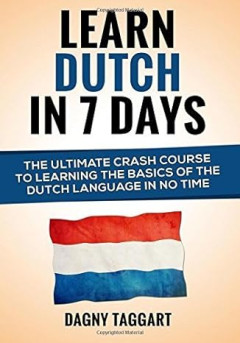
E-book Learn Dutch In 7 Days
- Edisi
- -
- ISBN/ISSN
- -
- Deskripsi Fisik
- 161 halaman
- Judul Seri
- -
- No. Panggil
- 439.3 TAG l
- Edisi
- -
- ISBN/ISSN
- -
- Deskripsi Fisik
- 161 halaman
- Judul Seri
- -
- No. Panggil
- 439.3 TAG l

E-book Tagalog: A Complete Course for Beginners
This simple and effective introduction to Tagalog will teach you everything you need to speak, understand, read, and write in Tagalog. This program assumes no background in the language, and it explains each new concept clearly with plenty of examples, making it ideal for beginners or anyone who wants a thorough review.
- Edisi
- -
- ISBN/ISSN
- 9781400023493
- Deskripsi Fisik
- 251 halaman
- Judul Seri
- -
- No. Panggil
- 499.211 LIV t
 Karya Umum
Karya Umum  Filsafat
Filsafat  Agama
Agama  Ilmu-ilmu Sosial
Ilmu-ilmu Sosial  Bahasa
Bahasa  Ilmu-ilmu Murni
Ilmu-ilmu Murni  Ilmu-ilmu Terapan
Ilmu-ilmu Terapan  Kesenian, Hiburan, dan Olahraga
Kesenian, Hiburan, dan Olahraga  Kesusastraan
Kesusastraan  Geografi dan Sejarah
Geografi dan Sejarah